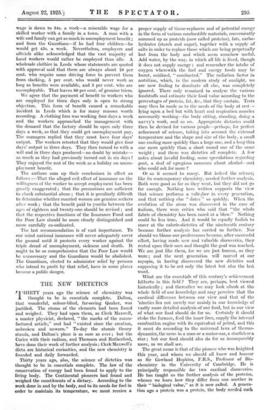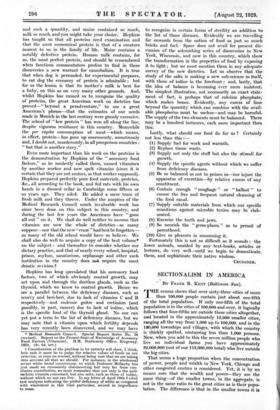THE NEW DIETETICS
filHIRTY years ago the science of chemistry was thought to be in essentials complete. Dalton, that wonderful, colour-blind, far-seeing Quaker, was justified. The atoms of the elements had been found and weighed. They had upon them, as Clerk Maxwell, a master physicist, declared, " the marks of the manu- factured article," and had " existed since the creation, unbroken and unworn." To-day the atomic theory stands, and Dalton's place is as sure as ever ; but the Curies with their radium, and Thomson and Rutherford, have done their work of further analysis ; Clerk Maxwell's dicta are historical curiosities, and the new chemistry is founded and daily forwarded.
Thirty years ago, also, the science of dietetics was thought to be in essentials complete. The law of the conservation of energy had been found to apply to the living body. The Continental pioneers had found and weighed the constituents of a dietary. According to the work done in and by the body, and to its needs for fuel in order to maintain its temperature, we must receive a proper supply of tissue-replacers and of potential energy in the form of various combustible materials, conveniently summed up as proteids (now called proteins), fats, carbo- hydrates (starch and sugar), together with a supply of salts in order to replace those which are being perpetually lost from the body and which seem somehow useful. Add water, by the way, in which all life is lived, though it does not supply energy ; and remember the intake of oxygen wherewith the fuel and energy foods may be burnt, oxidized, " combusted." The radiation factor in nutrition, which, in the modem study of sunlight, we are now finding to dominate all else, was completely ignored. There only remained to analyse the various foodstuffs and estimate their food value according to the percentages of protein, fat, &c., that they contain. Tests may then be made as to the needs of the body at rest— lying upon a bed but with heart and respiration muscles necessarily working—the body sitting, standing, doing a navvy's work, and so on. Appropriate dietaries could then be devised for various people—perhaps, for perfect refinement of science, taking into account the external temperature and the shape and size of the body, a small one cooling more quickly than a large one, and a long thin one more quickly than a short round one of the same weight ; and there was dietetics all complete. A few notes about invalid feeding, some speculations regarding gout, a deal of egregious nonsense about alcohol—and who could ask for more ?
Or so it seemed to many. But indeed the science; like its contemporary chemistry, needed further analysis. Both were good as far as they went, but they did not go far enough. Nothing here written supports the view that science performs a volte-face in every generation, and that nothing else " dates " so quickly. When the evolution of the atom was discovered in the case of radium, there were critics who said that "the whole fabric of chemistry has been razed at a blow." Nothing could be less true. And it would be equally foolish to sneer at the calorie-dietetics of the nineteenth century because further analysis has carried us further. Nor should we blame our predecessors because, after successful effort, having made new and valuable discoveries, they rested upon. their oars and thought the goal was reached. We are just like them, for we are just human, as they were ; and the next generation will marvel at our myopia, in having discovered the new dietetics and supposing it to be not only the latest but also the last word.
What are the essentials of this century's achievement hitherto in this field ? They are, perhaps, best viewed historically ; and thereafter we may look afresh at the whole field of our knowledge and may perceive that the cardinal difference between our view and that of the 'nineties lies not merely nor mainly in our knowledge of vastly more detailed analysis of our food, but in our view of what our food should do for us. Certainly it should stoke the furnace, feed the inner fires, supply the internal combustion engine with its equivalent of petrol, and this it must do according to the universal laws of thermo- dynamics, the same in a man or a motor-car, a starfish or a star ; but our food should also do for us incomparably more, as we shall see.
The great name is that of the pioneer who was knighted this year, and whom we should all know and honour as Sir Lowland Hopkins, F.R.S., Professor of Bio- chemistry in the University of Cambridge. He is principally responsible for two cardinal discoveries. He has taught us the further analysis of the proteins, whence we learn how they differ from one another in their " biological value," as it is now called. A genera- tion ago a protein was a protein, the body needed such and such a quantity, and maize contained SO much, milk se much, and you might take your choice. Hopkiiii has taught us that all proteins need examination and that the most economical protein is that of a creature nearest to us in the family of life. Maize contains a notably defectiVe protein. Human milk contains, for us, the most perfect protein, and shoidd be remembered when facetious commentators profesi to find in these discoveries a new warrant for cannibalism. It is true that when dog is persuaded, for experimental purposes, to eat dog the economy of protein is admirable ; but for us the lesson is that its mother's milk is best for a baby, on this as on very many other grounds. And whilst Hopkins has caused us to recognize the quality of proteins; the great American work on dietetics has proved" beyond a peradventure," to use a great American's phrase—that the estimates of our needs made hi Munich in the list century were grossly excessive. The school of " low protein " has won all along the line, despite vigorous resistance in this country. Meanwhile the per capita consumption of , meat—which means, in effect, protein—has gone up enormously, monstrously and, I doubt not, murderously, in all prosperous countries': " but that is another story."
EVen more important than his work on the 'proteins is the demonstration by Hopkins of the " accessory food factors," as he modestly called them, named iitainines by another worker and now spelt vitamins' (since it is certain that they are not amines, as that worker supposed). Hopkins prepared perfectly pure food materials, proteins, &c., all according to the book; and fed rats with his own hands in a disuSed cellar in Cambridge some fifteen or. so years ago. They ailed. He added a mere trace of fresh milk and they throve. Under the auspices of the Medical Researeh Council much inValuable work has since been done on this subject in this country, and during the last few years the Americans have " gone all out " on it. We shall do well neither to assume that vitamins are now the whole of dietetics—as many suppose—nor that the new " craze " had best be forgotten— as many of the old school would have us believe. We shall also do well to acquire a copy of the best volume* on the subject : and thereafter to consider whether our dietary practice, and that of nearly every school, hospital, prison, asylum, sanatorium, orphanage and other such institution in the country does not require the most drastic revision.t Hopkins has long speculated that his accessory food factors, two of which obviously control growth, may act upon and through the ductless glands, such as the thyroid, which we know to control growth. Hence we see a parallel between the deficiency diseases, such as scurvy and ben-ben, due to lack of vitamins C and B respectively—and endemic goitre and cretinism (and possibly, in part, cancer) due to lack of iodine, which is the specific food of the thyroid gland. No one can yet put a term to the list of deficiency diseases, but we may note that a vitamin upon which fertility depends has very recently been discovered, and we may have
* Medical Research Council. Special Report Series No. 38 (revised). Report on the Present State of Knowledge of Accessory Food Factors (Vitamins). H.M. Stationery Office, Kingaway. 1924. (4s. 6d. net.)
t Consideration of the problem in its entirety will show, I think, how rash it must be to judge the relative values of foods on one criterion, or even on several, without being sure that we are taking into account all that we should. For instance, in the wholemeal versus white bread controversy, to which Professoi Mellanby has jest made an excessively disconcerting but very far from con- elusive .contribution, we must remember that not only is the anti.- rachitic vitamin concerned, but also salts, such as those of iodine, without which no one can live. In my letter of April 18th. I cited new analzses indicating the pitiful deficiency of white as compared with wholemeal in this vital particular, second in imporfance to none. to recognize in certain forms of sterility an addition to the list of those diseasea. Evidently we are travelling far Onwards from the notion of food as just so much bricks and fUel. Space does not avail for present dis7 cithsion of the astonishing series of discoVeries in New York, Wiseonsin, and now in this country; which show the transformation in the properties of food by exposing it to light ; but we must mention them in any. adequate survey Of the new dietetics. Let us observe that the study of the salts is making a new sub-science in itself, with thoge of iodine in' the forefront ; and, lastly, that the idea of balance is becoming ever more insistent. The simplest illustration, not 'necessarily an exact state- ment of fact, is perhaps that of calcium' phosphate; which makes bones. Evidently, any excess of linie beyond the quantity which can combine with the avail- able phosphorus must be useless—and may be harmful. The supply of the two elements must be balanced. There may be a hundred instances, each more important than this: Lastly, what should our food do for Us? Certainly not less than this :— (1) Supply fuel for work and warmth.
(2) Replace tissue waste.
(8) Supply not only the stuff' but also the Stimuli, for growth.
(4) Supply the specific agents without which we suffer from deficiency diseaSes. '
(5) Be so balanced as not to poisen injure the apparatus of excretion—by relative excess of any constituent.
(6) Contain enough " roughage " or " ballast " to ensure the free and frequent natural cleansing of the food canal.
(7) Supply suitable materials from which our specific munitions against microbic toxins may be elab. orated.
(8) Exercise the teeth and jaws.
(9) So nourish the " germ-plasm " as to permit of - parenthood.
(10) Give us pleasure in consuming it.
Fortunately this is not so difficult as it sounds : the lower animals, unaided by any text-books, articles or lectures, do very well—until we begin to domesticate, them, and sophisticate their native wisdom.
' CRUSADER.



































 Previous page
Previous page